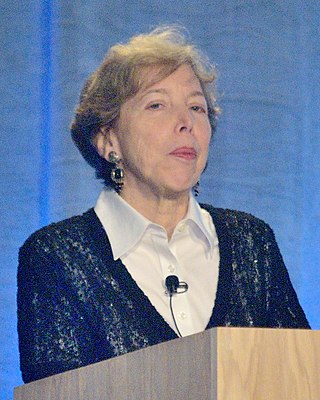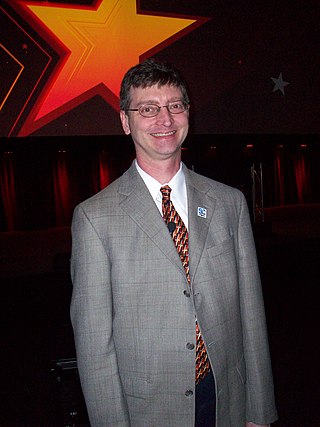Related Research Articles

The fat tree network is a universal network for provably efficient communication. It was invented by Charles E. Leiserson of the Massachusetts Institute of Technology in 1985. k-ary n-trees, the type of fat-trees commonly used in most high-performance networks, were initially formalized in 1997.

Jack Joseph Dongarra is an American computer scientist and mathematician. He is a University Distinguished Professor Emeritus of Computer Science in the Electrical Engineering and Computer Science Department at the University of Tennessee. He holds the position of a Distinguished Research Staff member in the Computer Science and Mathematics Division at Oak Ridge National Laboratory, Turing Fellowship in the School of Mathematics at the University of Manchester, and is an adjunct professor and teacher in the Computer Science Department at Rice University. He served as a faculty fellow at the Texas A&M University Institute for Advanced Study (2014–2018). Dongarra is the founding director of the Innovative Computing Laboratory at the University of Tennessee. He was the recipient of the Turing Award in 2021.
Ian Tremere Foster is a New Zealand-American computer scientist. He is a distinguished fellow, senior scientist, and director of the Data Science and Learning division at Argonne National Laboratory, and a professor in the department of computer science at the University of Chicago.

Charles Eric Leiserson is a computer scientist and professor at Massachusetts Institute of Technology (M.I.T.). He specializes in the theory of parallel computing and distributed computing.

Susan Lois Graham is an American computer scientist. Graham is the Pehong Chen Distinguished Professor Emerita in the Computer Science Division of the Department of Electrical Engineering and Computer Sciences at the University of California, Berkeley.

Ken Kennedy was an American computer scientist and professor at Rice University. He was the founding chairman of Rice's Computer Science Department.
David J. Kuck, a graduate of the University of Michigan, was a professor in the Computer Science Department the University of Illinois at Urbana-Champaign from 1965 to 1993. He is the father of Olympic silver medalist Jonathan Kuck. While at the University of Illinois at Urbana-Champaign he developed the Parafrase compiler system (1977), which was the first testbed for the development of automatic vectorization and related program transformations. In his role as Director (1986–93) of the Center for Supercomputing Research and Development (CSRD-UIUC), Kuck led the construction of the CEDAR project, a hierarchical shared-memory 32-processor SMP supercomputer completed in 1988 at the University of Illinois.

William Douglas Gropp is the director of the National Center for Supercomputing Applications (NCSA) and the Thomas M. Siebel Chair in the Department of Computer Science at the University of Illinois at Urbana–Champaign. He is also the founding Director of the Parallel Computing Institute. Gropp helped to create the Message Passing Interface, also known as MPI, and the Portable, Extensible Toolkit for Scientific Computation, also known as PETSc.
The Sidney Fernbach Award established in 1992 by the IEEE Computer Society, in memory of Sidney Fernbach, one of the pioneers in the development and application of high performance computers for the solution of large computational problems as the Division Chief for the Computation Division at Lawrence Livermore Laboratory from the late 1950s through the 1970s. A certificate and $2,000 are awarded for outstanding contributions in the application of high performance computers using innovative approaches. The nomination deadline is 1 July each year.
The Seymour Cray Computer Engineering Award, also known as the Seymour Cray Award, is an award given by the IEEE Computer Society, to recognize significant and innovative contributions in the field of high-performance computing. The award honors scientists who exhibit the creativity demonstrated by Seymour Cray, founder of Cray Research, Inc., and an early pioneer of supercomputing. Cray was an American electrical engineer and supercomputer architect who designed a series of computers that were the fastest in the world for decades, and founded Cray Research which built many of these machines. Called "the father of supercomputing," Cray has been credited with creating the supercomputer industry. He played a key role in the invention and design of the UNIVAC 1103, a landmark high-speed computer and the first computer available for commercial use.

Christopher Ray Johnson is an American computer scientist. He is a distinguished professor of computer science at the University of Utah, and founding director of the Scientific Computing and Imaging Institute (SCI). His research interests are in the areas of scientific computing and scientific visualization.
Guy Edward Blelloch is a professor of computer science at Carnegie Mellon University. He is known for his work in parallel algorithms.

James Weldon Demmel Jr. is an American mathematician and computer scientist, the Dr. Richard Carl Dehmel Distinguished Professor of Mathematics and Computer Science at the University of California, Berkeley.
Mary Lou Ehnot Soffa is an American computer scientist noted for her research on compilers, program optimization, system software and system engineering.

Keshav K Pingali is an American computer scientist, currently the W.A."Tex" Moncrief Chair of Grid and Distributed Computing at the University of Texas at Austin, and also a published author. He previously also held the India Chair of Computer Science at Cornell University and also the N. Rama Rao Professorship at Indian Institute of Technology. He is a Fellow of the American Association for the Advancement of Science, Association for Computing Machinery and Institute of Electrical and Electronics Engineers. In 2020, he was elected a Foreign Member of the Academia Europeana.
Professor David Abramson FIEEE FACM FTSE FACS is an Australian computer scientist. He has been Director of the Research Computing Centre at the University of Queensland, Australia, since 2012. He has been involved in computer architecture and high performance computing research since 1979.

ACM SIGARCH is the Association for Computing Machinery's Special Interest Group on computer architecture, a community of computer professionals and students from academia and industry involved in research and professional practice related to computer architecture and design. The organization sponsors many prestigious international conferences in this area, including the International Symposium on Computer Architecture (ISCA), recognized as the top conference in this area since 1975. Together with IEEE Computer Society's Technical Committee on Computer Architecture (TCCA), it is one of the two main professional organizations for people working in computer architecture.
In 1989, the International Parallel and Distributed Processing Symposium established the Charles Babbage Award to be given each year to a conference participant in recognition of exceptional contributions to the field. In almost all cases, the award is given to one of the invited keynote speakers at the conference. The selection was made by the steering committee chairs, upon recommendation from the Program Chair and General Chair who have been responsible for the technical program of the conference, including inviting the speakers. It is presented immediately following the selected speaker's presentation at the conference, and he or she is given a plaque that specifies the nature of their special contribution to the field that is being recognized by IPDPS.

Torsten Hoefler is a Professor of Computer Science at ETH Zurich and the Chief Architect for Machine Learning at the Swiss National Supercomputing Centre. Previously, he led the Advanced Application and User Support team at the Blue Waters Directorate of the National Center for Supercomputing Applications, and held an adjunct professor position at the Computer Science Department at the University of Illinois at Urbana Champaign. His expertise lies in large-scale parallel computing and high-performance computing systems. He focuses on applications in large-scale artificial intelligence as well as climate sciences.
References
- ↑ "Ian Foster is the recipient of the 2022 Ken Kennedy Award". awards.acm.org. Retrieved 2023-09-11.
- ↑ "Ian Foster is the recipient of the 2022 Ken Kennedy Award". awards.acm.org. Retrieved 2023-09-11.
- ↑ "Keshav Pingali Selected to Receive ACM-IEEE CS Ken Kennedy Award". 4 October 2023.
- ↑ "Ian Foster Named 2022 ACM-IEEE CS Ken Kennedy Award Recipient | Ken Kennedy Institute | Rice University". kenkennedy.rice.edu. Retrieved 2023-09-11.
- ↑ "Ian Foster to Receive ACM-IEEE CS Ken Kennedy Award". HPCwire. Retrieved 2023-09-11.
- ↑ Ormond, Jim (6 October 2016). "William Gropp Recognized for Major Contributions to High Performance Computing". Association for Computing Machinery. Retrieved 15 August 2017.
- ↑ Katherine Yelick: 2015 Ken Kennedy Award Recipient
- ↑ Charles E. Leiserson: 2014 Ken Kennedy Award Recipient
- ↑ Jack Dongarra: 2013 Ken Kennedy Award Recipient
- ↑ Mary Lou Soffa: 2012 Ken Kennedy Award Recipient
- ↑ Susan L. Graham: 2011 Ken Kennedy Award Recipient
- ↑ David Kuck#Honors
- ↑ "(press release) : ACM - IEEE Computer Society Award Honors Intel's Kuck for Innovations in High-Performance Computing". Archived from the original on 2010-12-05. Retrieved Oct 2, 2010.
The second annual ACM-IEEE Computer Society Ken Kennedy Award will go to Intel Fellow David Kuck for advances to compiler technology and parallel computing that have improved the cost-effectiveness of multiprocessor computing.
- ↑ "Citation - David J Kuck (awarded) the 2010 ACM - IEEE CS Ken Kennedy Award". Archived from the original on 2012-05-04. Retrieved Oct 2, 2010.
For his pioneering contributions to compiler technology and parallel computing, the impact of his research on industry, and the widespread influence of his teaching and mentoring.
- ↑ "Francine Berman: 2009 Ken Kennedy Award Recipient". Archived from the original on 2013-08-13. Retrieved 2011-11-23.